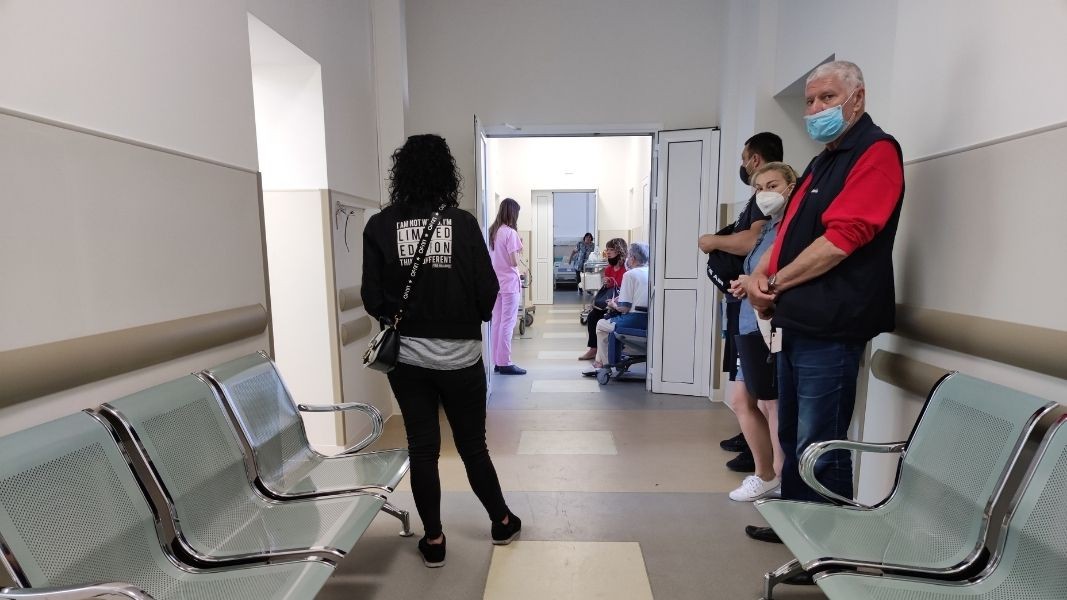Every morning, whether it is a working day or a day off, patients keep lining up in front of the office of Assoc. Prof. Petar Atanasov in the clinic of internal medicine of the University Multi-profile Hospital for Active Treatment and Emergency Medicine “N.I.Pirogov”. Most of them come for examination after overcome coronavirus infection and there are others who travel large distances across the country to be examined by the doctor. Before leaving, patients timidly ask him, "What do I owe you?" "Nothing," he smiles and adds: "Kindness is enough!"
Assoc. Prof. Atanasov* firmly believes that a doctor should not enter into financial relationships with his patients on any occasion. "A living person is not a checking account," he says, adding: "I don't want to deal with financial restrictions that could cause unintentional harm to a person's health. Whether by action or inaction, if you cause harm to a patient, it's not professional!”
At the beginning of March 2020, Assoc. Prof. Atanasov was among the first medics to encounter the viral infection in Bulgaria. Back then the Emergency Department, the Clinic of Internal Medicine and part of the intensive care unit in "Pirogov" swiftly turned into places for the treatment of patients with Covid-19, receiving the most severe cases. The whole responsibility for the difficult decisions during the crisis was taken by Assoc. Prof. Atanasov, being head of the entire Covid-19 department. He personally checked the condition of each patient and the feedback about the work he and his team did is extremely good:
"Thank you for the assessment! Patients are the victims and they can really assess whether we coped with the situation. We were just doing our job. We had analyzed the situation in the world and it was clear to me that we needed to find a solution. With a lot of fear I decided we should get natural immunization, starting with myself. It turned out that with reasonable actions, a person can acquire a stable and lasting immunity. Monitoring over 400 patients who survived the disease a year ago, I can say that in 99% of them the immunity continues to rise slightly.”

Pirogov's Covid-ward** has examined and treated over 5,000 patients whose condition was moderate or severe and over 20,000 milder cases have been diagnosed, treated and monitored. This provides an adequate picture of the complications of the disease. Unfortunately, many Bulgarians must rely on the goodwill of their GPs, who have to maneuver between the limits set by the Health Insurance Fund and the health condition of their patients. "We used to accept patients with diagnoses, but now we are forced to accept them with clinical pathways. This is an indicator that these things need to be corrected!” Assoc. Prof. Atanasov says and adds:

"In Bulgaria we have created some kind of a monopoly system and some templates, but a person cannot be treated according to templates," he says. “Medical treatment according to a dry and dead algorithm does not lead to good results. When it comes to a large threat, one would choose the lesser evil, but you still have to fight for every single human life! You have to invest more time, more money, more efforts, more thinking and of course more money, but I don't want money to attract my interest and show me the way! Very often this leads to savings at the expense of the patient's health and this is a crime against people!"
* Assoc. Prof. Dr. Petar Atanasov has been managing the internal medicine clinic of Pirogov Hospital since 2014, but he has been working at the hospital since 1992. He specialized in internal medicine, clinical hematology, scientific medical information, management and emergency medicine. He is author of over 100 scientific publications.
**The period of recovery must be monitored because of risk of permanent and life-threatening complications. A call center for patients is available. It is used for monitoring patients under home quarantine and for former patients who continue to be monitored for a period of a year. There is also a hotline for psychological help.
Photos: Darina Grigorova
"I am Haki Kan - a writer, 29 years old from Kardzhali. I do charity work and I write, these are my two main activities. I want to bring inspiration through my words and I want my deeds to be inspirational". This is how our latest report about the..
The Bulgarian cultural association in Cyprus is named after a renowned Bulgarian revolutionary, one of the organizers of the April Uprising of 1876 – Atanas Shabanov from Koprivshitsa. “We wanted the association to bear the name of a Bulgarian..
As soon as the first snow is in the air, Veska Cherneva gets down to work. Using a simple pair of scissors and paper, she has cut out more than 5,500 beautiful snowflakes. As a matter of fact, she says her life has always been about… snow...

+359 2 9336 661
